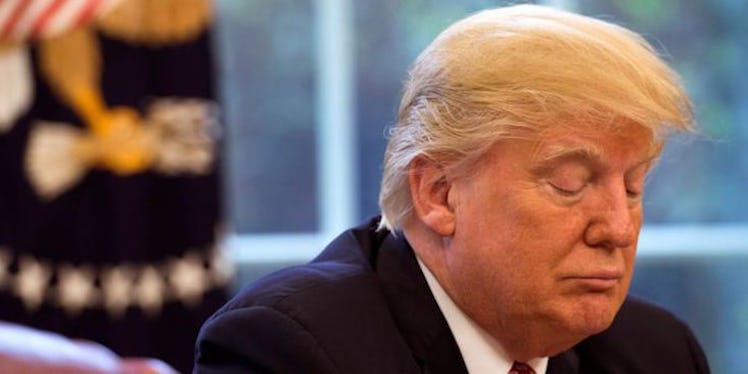
Trump Says Border Wall Will Help End Drug Culture In The US, But He's Wrong
President Donald Trump claimed his border wall would help end the drug culture in the US during a recent interview with AP.
But, he's wrong.
In the interview, which was extremely bizarre overall, Trump said,
If we stop 1 percent of the drugs from coming in -- and we'll stop all of it. But if we stop 1 percent of the drugs because we have the wall -- they're coming around in certain areas, but if you have a wall, they can't do it because it's a real wall. That's a tremendously good investment, 1 percent. The drugs pouring through on the southern border are unbelievable. We're becoming a drug culture, there's so much. And most of it's coming from the southern border. The wall will stop the drugs.
Much like everything else Trump says about his border wall, such as that it will only cost $10 billion and Mexico will pay for it, that's simply not true.
A border wall will not stop drugs from coming into the US.
Drug smugglers are increasingly using secure checkpoints along the US-Mexican border as entry points.
In San Diego County, where the busiest land border crossing in the world is located -- the San Ysidro Port of Entry -- there are as many as three border fences in some sections, NBC News reports.
This hasn't deterred drug smugglers, who put drugs in small packages and hide them wherever they can in vehicles.
In the San Diego border sector, the amount of heroin seized by border agents has quadrupled since 2010 and meth seizures have tripled over the same period.
Some drug smugglers are caught, some are not.
This strongly undermines Trump's case for a border wall.
In short, drug smugglers will still find a way to get across, regardless of security or a wall.
Meanwhile, the bigger issue with drugs in the US is not what's occurring at America's borders, but within them.
During the second presidential debate in October 2016, Trump made a similar claim to what he stated in the AP interview, and he was wrong then too.
"We are also letting drugs pour through our southern border at a record clip," he said.
Responding to this in an article for The New York Times, Ian Grillo, author of "Gangster Warlords: Drug Dollars, Killing Fields and the New Politics of Latin America," said,
This is not true. The amount of marijuana being seized on the southern border, which far outweighs the other drugs, has gone down from 2.5 million pounds in 2011 to 1.5 million pounds last year. That is most likely because of the legalization of marijuana for recreational or medicinal use in a growing number of American states... The amount of cocaine being seized has also gone down over the last two decades – most likely because of a decline in the crack cocaine use in American inner cities. However, the amount of heroin and crystal meth being seized on the border has gone up in recent years – but again probably because of changes in the patterns of American drug consumption rather than a weakness in border security.
Indeed, patterns of drug consumption in the US are the bigger issue here.
Legal opioid painkillers are the real drug problem in the US.
Today, drug overdoses kill more Americans than HIV/AIDS did at its peak.
Clearly, drugs are a major problem in the US, but Trump is wrong about the source of the issue.
Americans are dying from totally legal, but highly addictive, opioid painkillers at an exponential rate.
In 2015 alone, the opioid epidemic claimed over 30,000 lives.
That same year, more people died from heroin-related causes than from gun homicides.
When people can no longer gain access to or afford legal opioid painkillers, they often move on to heroin.
There are many steps we could take in the US to help thwart this, including legalizing medical marijuana, but the Trump administration is against this.
In March, Attorney General Jeff Sessions said it was “stupid” to believe marijuana could help in this regard, and said pot is “only slightly less awful than heroin.”
White House Press Secretary Sean Spicer seems to agree.
They couldn't be more wrong.
Pot is nonfatal. Even the DEA admits no one has ever died from a marijuana overdose.
On top of being nonfatal, research shows medical marijuana can be very effective in treating chronic pain. It could serve as a substitute for the opioid painkillers that have led to the current epidemic.
In January 2017, the National Academies of Sciences, Engineering, and Medicine released its review of more than 10,000 studies on weed.
It found plenty of evidence that patients treated with cannabis or cannabinoids had a “significant reduction” in pain symptoms.
Many recovering from opioid addiction also say medical marijuana has helped them deal with the agony of withdrawal.
So, it's not surprising research shows states with greater access to medical marijuana see less opioid overdoses.
The annual number of deaths from prescription drug overdoses is 25 percent lower in states where it's legal to use medical marijuana.
Also, hospital visits related to opioid painkiller addiction and abuse dropped 23 percent on average in states that have legalized medical marijuana.
If medical marijuana can help save lives, reduce pain and potentially treat addiction, why isn't the Trump administration on board?
It seems Trump would rather continue to demonize America's southern neighbors and spread fear about the weakness of border security than consider the hard facts and take actions that could actually help combat the drug culture in the US.
Meanwhile, more will continue to die from an epidemic caused by legal drugs.